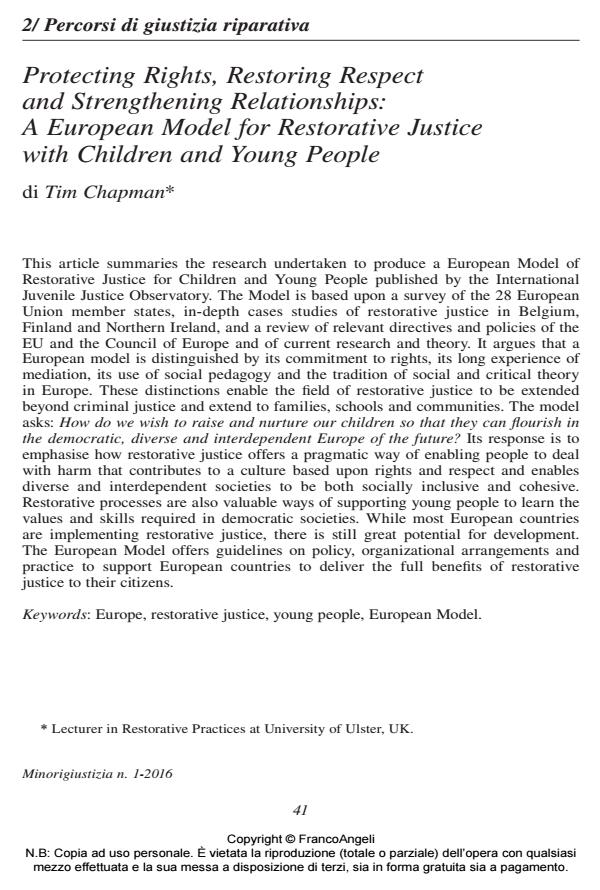Protecting Rights, Restoring Respect and Strengthening Relationships: A European Model for Restorative Justice with Children and Young People
Journal title MINORIGIUSTIZIA
Author/s Tim Chapman
Publishing Year 2016 Issue 2016/1
Language English Pages 8 P. 41-48 File size 91 KB
DOI 10.3280/MG2016-001005
DOI is like a bar code for intellectual property: to have more infomation
click here
Below, you can see the article first page
If you want to buy this article in PDF format, you can do it, following the instructions to buy download credits

FrancoAngeli is member of Publishers International Linking Association, Inc (PILA), a not-for-profit association which run the CrossRef service enabling links to and from online scholarly content.
This article summaries the research undertaken to produce a European Model of Restorative Justice for Children and Young People published by the International Juvenile Justice Observatory. The Model is based upon a survey of the 28 European Union member states, in-depth cases studies of restorative justice in Belgium, Finland and Northern Ireland, and a review of relevant directives and policies of the EU and the Council of Europe and of current research and theory. It argues that a European model is distinguished by its commitment to rights, its long experience of mediation, its use of social pedagogy and the tradition of social and critical theory in Europe. These distinctions enable the field of restorative justice to be extended beyond criminal justice and extend to families, schools and communities. The model asks: How do we wish to raise and nurture our children so that they can flourish in the democratic, diverse and interdependent Europe of the future? Its response is to emphasise how restorative justice offers a pragmatic way of enabling people to deal with harm that contributes to a culture based upon rights and respect and enables diverse and interdependent societies to be both socially inclusive and cohesive. Restorative processes are also valuable ways of supporting young people to learn the values and skills required in democratic societies. While most European countries are implementing restorative justice, there is still great potential for development. The European Model offers guidelines on policy, organizational arrangements and practice to support European countries to deliver the full benefits of restorative justice to their citizens.
Keywords: Europe, restorative justice, young people, European Model
Tim Chapman, Protecting Rights, Restoring Respect and Strengthening Relationships: A European Model for Restorative Justice with Children and Young People in "MINORIGIUSTIZIA" 1/2016, pp 41-48, DOI: 10.3280/MG2016-001005